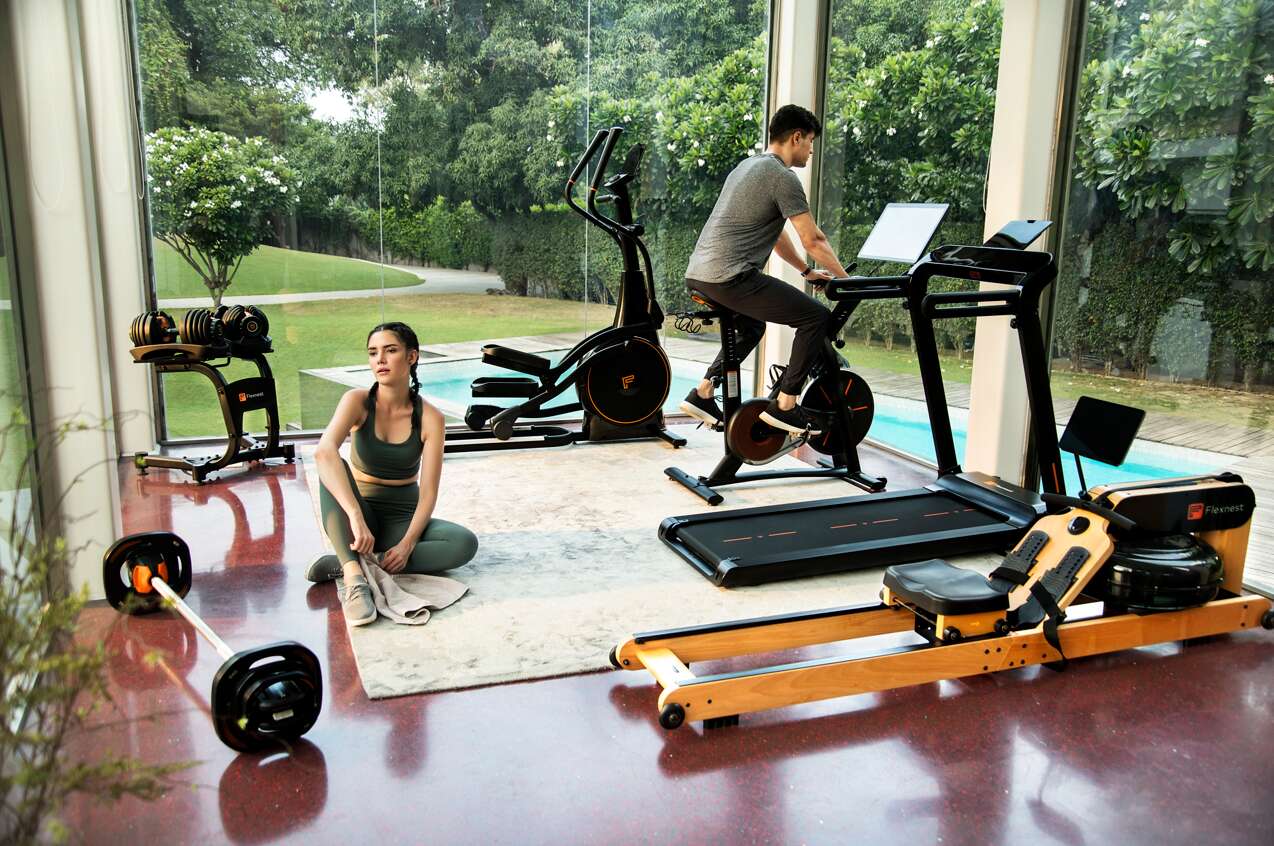Couple’s Startup for Home Gym Equipment Earns $5 Million in Revenue With Zero Funding
Rhea and Raunaq Anand founded Flexnest, a ‘fit-tech’ startup that is creating smart connected fitness solutions for the Indian market to enable a well-equipped home workout regime.

When the pandemic struck India in March 2020, fitness enthusiasts Rhea Anand Singh and her husband Raunaq were in Delhi looking for ways to work out. With all the gyms shut down, they began looking for fitness products that could be used at home.
They were unhappy to find that nothing appropriate for the purpose existed in the Indian market. Available at the time were either poor-quality products at mom-and-pop stores or very high-end imported equipment which could cost several lakhs. Moreover, they didn’t find any ‘holistic product’ available in India with integrated hardware/software/content.
“There was nothing available in the middle, which was premium but accessible. We wanted to fill that gap,” says Rhea, in a conversation with The Better India.
For Raunaq, the problem was two-fold. In the D2C space, according to him, nobody was building a real brand around home fitness products. Those engaged in selling these products were just engaged in selling undifferentiated hardware on marketplaces, resulting in a price war. All fitness equipment brands were reliant on the marketplace but nobody had built a real brand in the fitness equipment space, powered by technology and content, he argues.
“Also, there was no smart and connected fitness equipment brand or product in India. Watches have become smart watches, TVs have become Smart TVs, and phones have become smartphones. While fitness equipment in the West has gone smart-connected, that wasn’t the case in India. For example, if you go to a gym today in Delhi, you will see equipment with the same analogue dots, LEDs on the console of the exercise bike or treadmill and that was available 20 years ago. Looking at this gap, we felt that we could become the category creator and launch smart fitness equipment,” says Raunaq.
In January 2021, the couple launched their venture Flexnest, a ‘fit-tech’ startup creating smart connected fitness solutions for the Indian market focusing on building a full portfolio of connected equipment and online classes to enable a well-equipped home workout regime.
As a D2C brand focused exclusively on at-home equipment and workouts, it has done remarkably well with no external funding from venture capitalists or funds.
According to a report in Inc42 Media, a publication covering Indian startups, it recorded a revenue of Rs 3.83 crore in January 2022. Going further, the couple claims to have generated an annualised revenue of over $ 5 million (approximately Rs 40 crore) in over a year since its launch.
Starting small
The couple’s experience with smart fitness products comes from their time in the United States. Rhea majored in economics at Emory University in Atlanta, following which she had a short stint at NDTV in media productions and then a career in public relations. Raunaq, meanwhile, pursued mechanical engineering at UC Berkeley and a master’s degree in management at Duke University before spending seven years in the auto component manufacturing industry.
“The challenges we had to face before launching Flexnest was to ensure that this wasn’t just another D2C brand. We had to create our own studio where all these workouts are shot, onboard fitness trainers, develop the tech stack, the iOS and Android apps and IoT firmware in the devices, while the lockdown was in force. We also didn’t want to wait till the pandemic had subsided because it was the perfect time to build a brand. After all, everyone was hungry for these solutions locked at home, so we had to speed through this process,” says Raunaq.
In terms of fitness equipment, what we see today in the Flexnest portfolio isn’t the same as when it launched. The process of building this portfolio has been gradual.
“The first two or three months saw us launching a small collection because smart products take time to develop, particularly the software, content, etc. During these months we were selling dumbbells, yoga mats and other essentials that were easy to bring into the market. We focussed on building out this mass premium category with those products because we could launch them quicker. The first smart product we launched was a weighing scale,” he recalls.
“A few months later we launched a smart exercise cycle (Flexbike) and then our rowers (Flexrower). In December 2021 we launched our elliptical cross trainers, and recently we launched our treadmills (Flexpad). It has been a phased rollout of products,” he adds.
Another important decision early on was not to manufacture these products themselves. Designed in Berlin, Germany, they are manufactured in Taiwan and China.
“Given that we are this early in our entrepreneurial journey, we didn’t have the requisite time or capital to set up a manufacturing space,” notes Rhea.
Raunaq goes on to add, “Are we at a stage in India where we are not quite ready to manufacture smart fitness products here? Yes, in terms of cardio equipment, more than 95% is imported in India. Why is this the case? The ecosystem of manufacturers and suppliers of smart fitness equipment is not present yet. Also, economics dictates how a category plays out. In this category, the import duties are lower and costs are more reasonable for the consumer, etc.”

No support from VCs yet
So far, the startup claims they haven’t raised any capital from a venture capital fund or angel investors. They’ve raised capital from banks, and other financial institutions, and mixed that with capital raised internally through largely their savings.
“Our economics has allowed us to hold the ship stable without needing any external capital. We are one of the lucky ones who have managed to delay the requirement of external funding. But you never know in terms of scaling this up in the future, how this might change,” says Raunaq.
“Initially, when we were starting, we didn’t require external funding. Once we came to a stage where we wanted to launch more products and invest more, we did have that conversation internally about exploring the need for external funding. But then at that point when we saw how well we were doing in terms of profitability, and so it didn’t make much sense,” recalls Rhea.
“Also, we have a policy of trying not to burn through our cash reserves. Be it our marketing or anything, we do have a no-burn policy for as long as possible. If we were to raise capital through VCs and different funds, we would want someone who is bringing more than just money. It has to be a good match or they should be able to fill the gaps that we can’t,” she adds.
Smart and connected
Flexnest’s top-selling products are their connected-cardio products, which include the Flexbike and Flexrowers (India’s first connected rower which offers a full body workout) backed by online classes and apps.
“Suppose, I have a fitness goal of building muscle mass. What are the steps I would follow? I would essentially buy equipment, probably a pair of dumbells which you can get from Flexnext. Second, I would require some content which would teach me how to use my equipment, for which you require classes that we provide. Third, what you require is a way to measure your improvement. We retail a scale as well, which is like a fitness tracker, helping you track how well you’ve done in terms of hard metrics, data comparisons, etc.,” says Rhea.
“We are a one-stop shop, where people find an ecosystem of home fitness. As stated earlier, just three weeks ago, we launched a product called the Walking Pack which is a foldable treadmill. That is something which is doing well too,” she adds.
In terms of sales, about 55 per cent comes from Tier 1 cities and the rest in Tier-2 and Tier-3 cities. Starting out, Rhea and Raunaq saw the potential of their business, but have been “pleasantly surprised” at the speed at which they have generated revenues.
“Having said that, our market share in the Indian fitness market wouldn’t be more than 1-2 per cent, and we’re looking to grow that further,” says Rhea. If you found our stories insightful, informative, or even just enjoyable, we invite you to consider making a voluntary payment to support the work we do at The Better India. Your contribution helps us continue producing quality content that educates, inspires, and drives positive change. Choose one of the payment options below for your contribution- By paying for the stories you value, you directly contribute to sustaining our efforts focused on making a difference in the world. Together, let’s ensure that impactful stories continue to be told and shared, enriching lives and communities alike. Thank you for your support. Here are some frequently asked questions you might find helpful to know why you are contributing?

“For the next few months, we want to focus on developing our cross-trainer and treadmill portfolio. Overall, our objective is to continue building this ecosystem of products. We are also looking at wearable devices and adjacent categories in apparel as well. We want to complete all the requirements of a user in their fitness journey whether it’s apparel, cardio equipment, etc. Also, in the medium-long term, there is a strong opportunity to manufacture these products in India. But the economics of this endeavour into manufacturing has to line up and we also need the right manufacturing partners to support that push,” says Raunaq.
(Edited by Yoshita Rao; Feature image of Rhea and Raunaq Anand Singh)
Additional Source:
‘As India Moves To At-Home Workouts, D2C Brand Flexnest Bets Big On Connected Fitness Gear’ by Tapanjana Rudra; Published on 7 April 2022 courtesy Inc42 Media
This story made me
-
97
-
121
-
89
-
167















